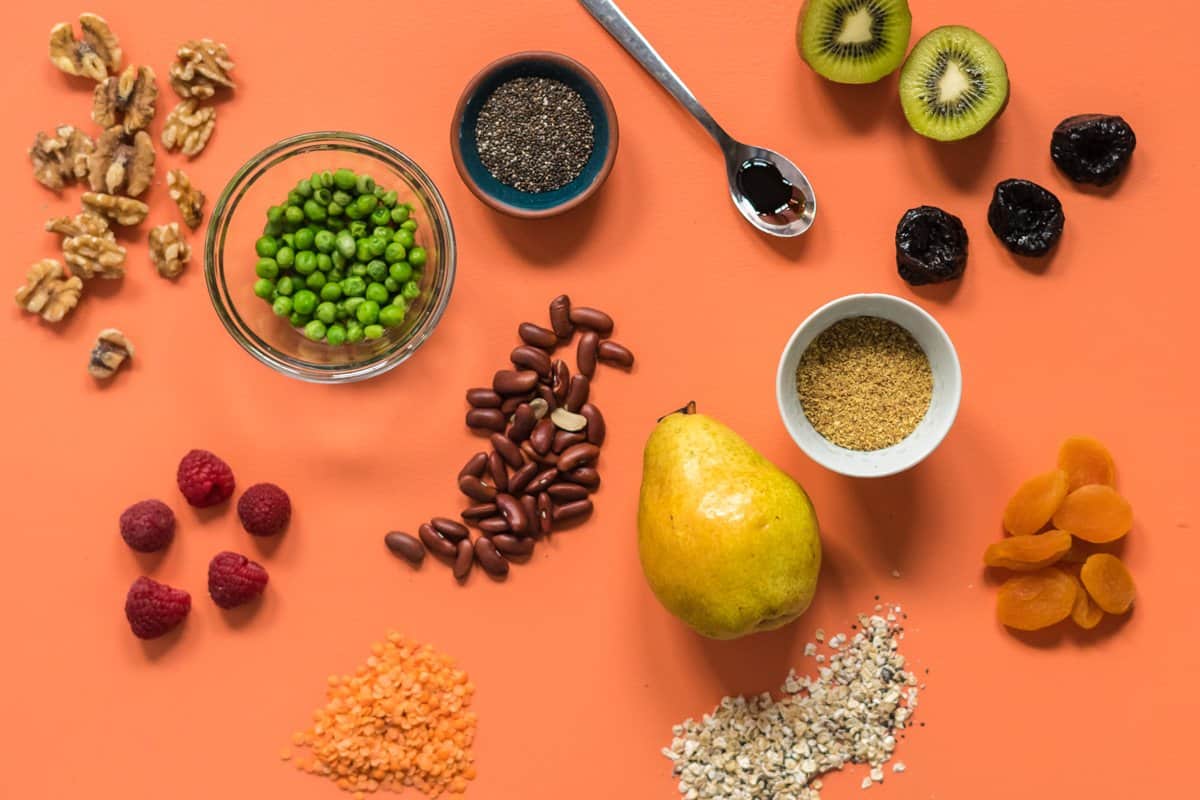It’s always a poopy situation when your baby is having a…poopy situation.
We’re mamas first but we also happen to be Registered Dietitians, which basically means we are pretty darn comfortable talking about poop!
A lot of babies may inherently struggle with bowel movements and experience constipation at some point in their life, so, what’s a parent to do? We’re hoping to cover all of that right here in this blog post! Before we get right into this, it’s a good idea that we review an important mechanism in the human body: the gastro-colic reflex. This reflex is triggered by eating and takes place in babies, children and adults! This reflex stimulates your gut (mostly your large intestine) to contract and move contents along. It’s actually all thanks to this reflect that many babies pass a bowel movement shortly after a bottle, nursing session or eating solid food!
Now that we’ve covered that…
What is constipation?
Constipation is when stools become hard and are difficult to pass. Contrary to popular belief, your baby doesn’t need to poop daily. The frequency is important, yes, but even more important is whether a baby can pass stool easily. That’s what we’re going for!
Truthfully, all babies are different and go by their own unique “constitution”; it’s important to recognize there are many “normal” patterns for bowel movements. Some babies will poop multiple times each day, others may poop every other day and some may go even longer.
Breastfed babies may go several times or day or may go days or weeks in between pooping! Jessica attended a learning event with a group of pediatricians and they were comparing how long their patients had gone in between pooping. One doctor had a healthy baby that went 27 days between poops! Since the doctors were looped into what was going on, that means the parents were in contact with their pediatrician. If you feel something is up with your little one, don’t be afraid to get in touch with your primary care provider.
On the other hand, formula fed babies have less variably and won’t typically go for days or weeks without pooping.
Some parents are overly concerned about how often their child has bowel movements, because they have been taught that a healthy child has a bowel movement every day. This is not true. The frequency of bowel movements is not as important as whether the child can pass stools easily. Your child is not constipated if his or her stools are soft and pass easily, even if it has been awhile since the last bowel movement.
A constipated baby will strain when having a bowel movement and when it does pass, it will be hard, and pellet-like, aka it will look like rabbit poop!
If your baby is constipated they may have a red face when trying to pass stool, you may see blood in their stool (black or fresh blood) or they may be fussy.
What can cause a baby to be constipated?
There are a host of reasons why a baby may develop constipation. A few include:
- Change in routine
- Dehydration
- Medication use
- Undiagnosed allergy to cow’s milk protein
- Decreased gut motility
- Potty training before the child is ready
- Transition to solid food
- Sudden increase in iron
- Not enough fiber intake
When should I be concerned?
An occasional bout of constipation is not worrisome but if you see blood in your baby’s stool or if constipation is a constant struggle, it’s ideal to get support from your physician or a health care provider to ensure that there aren’t other issues at play such as a motility issue, undiagnosed allergy, or other disease processes.
Ultimately, we want to do what we can to protect babies from constipation to prevent further complications. We don’t want to teach our baby they need to “push hard” to pass stool. Additionally, we know all too well that constipation can also contribute to poor appetite. Think about the last time you were a wee bummed up? You probably didn’t feel too much like eating.
Don’t be alarmed if your doctor prescribes medication as an intervention.
Dietary strategies are useful to keep things flowing but they don’t often work to get things moving.
A medication can kickstart a bowel movement and strategic food and fluid choices can keep up the momentum!
How does introducing solids change my baby’s poop?
Parents…get ready! If you’ve just recently embarked on starting your baby on solid food you might have noticed a change in their bowels – everything from the color, consistency, and frequency may change!
Think about it: for the last six months or so, your baby has been exclusively relying on a liquid diet in the form of breastmilk and/or formula. Now, your baby’s gut is slowly being introduced to more and more solid foods. To add, your baby is forming so many more enzymes in their intestinal tract to digest new foods. Once solids have started, this will naturally require a period of adjustment. Knowing from the outset that digestion is an adaptation process and in many ways, that passing stool is a learned behavior, might be helpful!
So yes, you may notice:
- Your baby is pooping more often
- Your baby is pooping less often
- Your baby’s poop color has changed to a darker color
- Your baby’s poop has undigested food in it (don’t worry too much about this!)
Help! My baby started on solids and is now constipated!
Okay, okay, so you’re here and you want allllll the goods on how to relieve your baby’s constipation. Here are a few things to keep in mind, we’ve tailored these suggestions for those of you that have in fact started on the fun journey of #StartingSolidsConfidently:
- Offer your baby a massage: touch therapy on your baby’s abdomen can be a really effective way to relieve constipation. The theory is really simple: by applying gentle pressure on their tummy, you’re mechanically encouraging stool to pass along. A common massage is affectionately titled “I love You”.
- Offer your baby some water: at around 6 months of age, you can offer your baby 2 – 4oz of water each day. This will help increase hydration, moisten the stool, and hopefully allow for easier passing. In some cases, your physician may encourage you to offer more water – the key is that we don’t want to displace the intake of formula or breastmilk which has critical nutrition for your baby. That being said, you can also feed/nurse more too.
- Speaking of water, offer your baby a warm bath. The warm environment can help your baby to relax the muscles that make up their tush and allow for a relaxed poop.
- Take a break from iron fortified infant cereal: the iron in infant cereal can sometimes be constipating for babies. If you’ve been offering it daily, consider taking break and offering it every few days instead. This also allows you an opportunity to offer other naturally iron rich foods like chicken, lentils or tofu.
- Offer your baby foods that contain fibre or are known to promote laxation. Some of these foods simply add more bulk to stool, allowing it to pass better. Meanwhile, other foods draw water into the large intestine (via osmosis) to moisten the stool.
Keep the hydration piece in mind – if you offer your baby a whopping load of fibre without offering more water, that too could be a recipe for constipation!
The following list of foods are all known to promote laxation:
- Apricots
- Berries
- Beans and lentils
- Kiwi
- Molasses
- Nuts
- Peach
- Pear
- Peas
- Plum
- Stewed prunes
- Seeds – especially ground flaxseed or chia seed!
- Whole grains
Lucky for you, a lot of the recipes included in our e-book Whole Food Recipes for Baby contain these ingredients!

- Limit cheese and other dairy products: in the context of a balanced diet, dairy products in and of themselves are not constipating. However, dairy has zero fibre so if babies are overconsuming dairy, they’re likely undereating other food groups, such as whole grains, fruit, and veggies, which contain fibre. Additionally, hard cheeses (such as cheddar) are low in fluid.
- Skip The Green Bananas: Anecdotally, many people claim that bananas make them constipated. This may be due to eating firm, green bananas. As bananas ripen, their nutritional composition actually changes! Green bananas are high in tannins, which can be constipating when eaten in large quantities.

We sincerely hope your baby doesn’t have to struggle through constipation, and if they do, that it’s short lived. If the suggestions here don’t seem to be helping, do reach out to your health care provider or a local Registered Dietitian who can help design a tailored nutrition care plan for your tiny tot.






